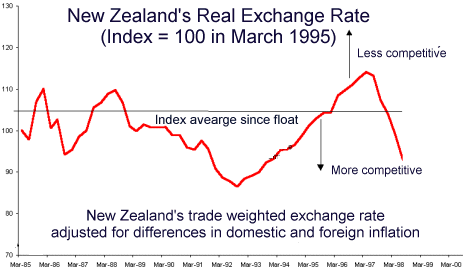Kiwi dollar diagnosis: patient’s feet hot, head cold, temperature fine
WestpacTrust chief economist Adrian Orr gives his diagnosis on the health of the Kiwi dollar, and outlines a prescription.
Thursday, November 2nd 2000, 6:46PM
The New Zealand dollar has hit a record low of 40 cents against the United States dollar, and an index level of 46 on the trade-weighted exchange rate. This has put New Zealand exporters and those competing against imports in a very competitive position.
What is behind this weak dollar, and what does it mean for the country?
The New Zealand dollar is not alone in its weakness. As much as it is a weak kiwi dollar story, it is also a strong US dollar one. Most currencies, such as the Australian dollar and Euro, have struggled against the ‘big dollar’ over recent years, with the US ruling in the growth stakes.
In a global market, investors will chase the highest, risk-adjusted sustainable yield. The US has ruled the roost in recent years. Investors, both foreign and domestic, will not return to these shores until local returns are again relatively competitive.
Such a turnaround in relative growth performances is not likely until at least the end of this year – if not early next year. The US economy is expected to cool off, either on its own, or induced by higher interest rates. Meanwhile, NZ exporters and those competing against imports will provide solid returns and growth will become more widespread.
Beyond this cyclical influence, other factors will act to constrain just how far the kiwi dollar can rise. It is very unlikely we will see the exchange rate peaks of the mid-1990s in the next couple of years – much to everyone’s relief.
For the New Zealand dollar to appreciate in any significant fashion, an improvement in the external deficit position of the country will have to occur. Looking ahead, this implies less spending and more saving, and continued subdued asset (house) prices. Given that ‘we consume therefore we are’, New Zealanders are likely to feel a little down for a while yet.
An external deficit correction also implies more spending by foreigners on New Zealand goods and services. A competitive exchange rate and subdued domestic demand pressures will facilitate this. The cockies may be running hot, but this won’t keep the cockles of urban consumers warm.
A downward revaluation of NZ assets relative to foreign assets has happened quickly in the New Zealand equity market. In foreign dollar terms, our equities are now looking good value – particularly in those industries involved in exporting.
By contrast, lending to New Zealanders still looks poorly rewarded. New Zealand has borrowed a lot over the last decade – households in particular – and investors are now concerned about our ability to repay it. New Zealand will continue to make a large sucking sound in world capital markets, to the tune of $20bn or so over the next 3 years just to finance our savings shortfall.
For New Zealand to attract capital, we need to convince investors of our ability to repay them and make them money to boot. If we can’t, then we shouldn’t be surprised to see the relative cost of borrowing rise – as our risk premium increases - and domestic demand to remain sluggish.
The direction of government policy is another factor influencing the value of the kiwi dollar. A shift toward higher government spending will keep pressure on New Zealand’s external debt position. The Government is one-third of the economy, so when it spends it is noticed. If an elephant shifts its weight in a dinghy (floating in the choppy global capital ocean), expect some movement in the boat. More importantly, if you don’t have much freeboard (i.e., we are debt-laden), then expect to get wet and be uncomfortable.
New Zealand’s relative growth prospects have been marked down over recent years given our patchy growth performance following consecutive droughts and an Asian financial crisis. The current under-exuberance about our growth prospects is in stark contrast to the over-exuberance prevalent in the early and mid-1990s. As always, reality lies between these two manic extremes.
When will the kiwi dollar find a floor and begin to appreciate?
Several wagons will need to circle before the cavalry arrives. These include an improvement in the current account deficit, stronger demand in New Zealand, and a slowdown in the US economy – either of its own doing or through Dr Greenspan’s interest rate wizardry. This lager is unlikely to be formed until late this year, if not early 2001.
Until then, expect the currency to remain lacklustre. Exporters will be glad, consumers will be sad, and investors will follow the fad.

Adrian Orr is the chief economist at WestpacTrust
| « Find out which managers have been performing well | King builds an empire » |
Special Offers
Commenting is closed
| Printable version | Email to a friend |









